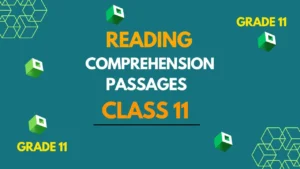Adverbial Clauses Examples and Types are necessary to know as this is important for writing correctly and speaking as well. Sometimes, to join two or more sentences with adverbial clauses, and to make complex sentences, Adverbial Clauses Examples, and Types play a crucial role in English Grammar.
If a small part of a sentence of a bigger sentence acts as an adverb i.e modifies a verb, an adjective, or another adverb in the sentence, that small part of a sentence will be an Adverbial Clause. Adverb Clause can be introduced by any of the subordinating conjunctions except the conjunction “that” when it is used in the sense of Apposition.
Example:
(i) He came when I was there.
‘when I was there‘ is a Subordinate Adverb Clause modifying the verb, ‘came’ and the Principal Clause is “He came”
(ii) The tree is taller than it appears.
Hear the Adverb Clause modifies the adjective “taller”.
(iii) He was so weak that he could not speak.
Here the Adverb Clause modifies the adverb “so”.
How to identify Adverbial Clauses
To identify an adverbial clause in a complex sentence, just find out the linker or the connector given in the sentence. If the linking words belong to any of the categories of Adverbs, and the subordinate clause does the work of an adverb, this will be an Adverbial Clause.
People also ask
erbial Clauses Types and Examples
Like adverbs, Adverbial Clauses express ‘Time‘, ‘Place‘, ‘Reason (Cause)‘, ‘Purpose‘, ‘Result‘, ‘Condition Or Supposition‘, ‘Manner or Extent‘, ‘Contrast (Concession)‘, ‘Comparison‘. So, there are nine types of Adverbial clauses in English Grammar. All Adverbial Clauses Types and Examples are discussed below.
1. Adverbial Clauses of Time
Adverbial clauses of Time show when the action is done. Adverb clauses of Time are introduced by the subordinate conjunction i.e. when, before, etc.
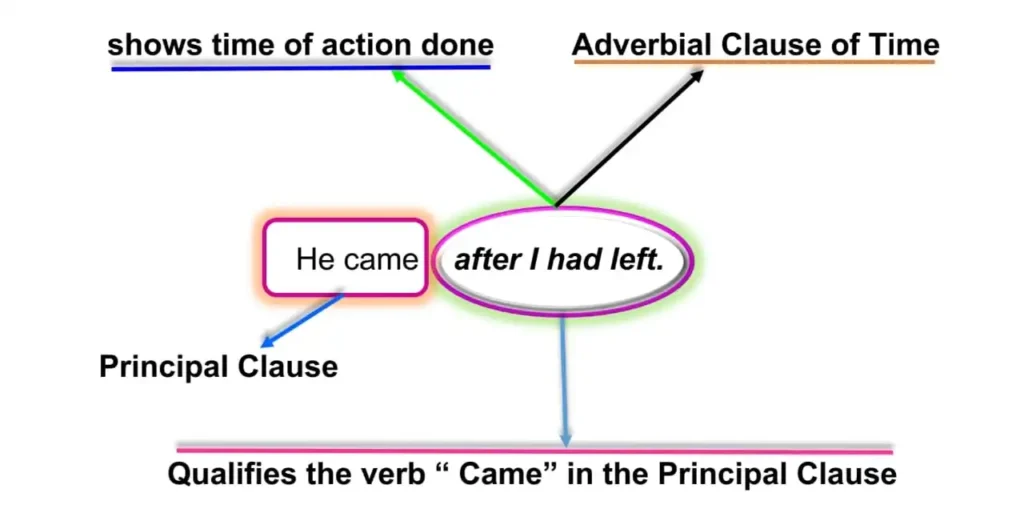
Examples of Adverbial Clauses of Time
(I) He came after I had left.
Explanation: “after I had left” is a subordinate adverbial clause and it qualifies the verb “came” in the principal clause “He came.”
(ii) Wait till I return.
Explanation: “till I return.” is a subordinate adverbial clause and it qualifies the verb “wait in the principal clause “(You) wait ”
(iii) Six years have passed since he left school.
Explanation: ‘since he left school.’ is a subordinate adverbial clause and it qualifies the verb “have passed” in the principal clause “Six years have passed”
Linkers or Connectives of Adverbial Clause of Time:
Normally, To identify subordinate adverbial clause and join two or more simple sentences, the following linkers or connectors are used.
when, before, after, till, until, since, as soon as, no sooner…….. than, while.
2. Adverbial Clauses of Place
Adverbial clauses of Time show where the action is done. Adverb clauses of Place are introduced by the subordinate conjunction, where, whence, wherever.
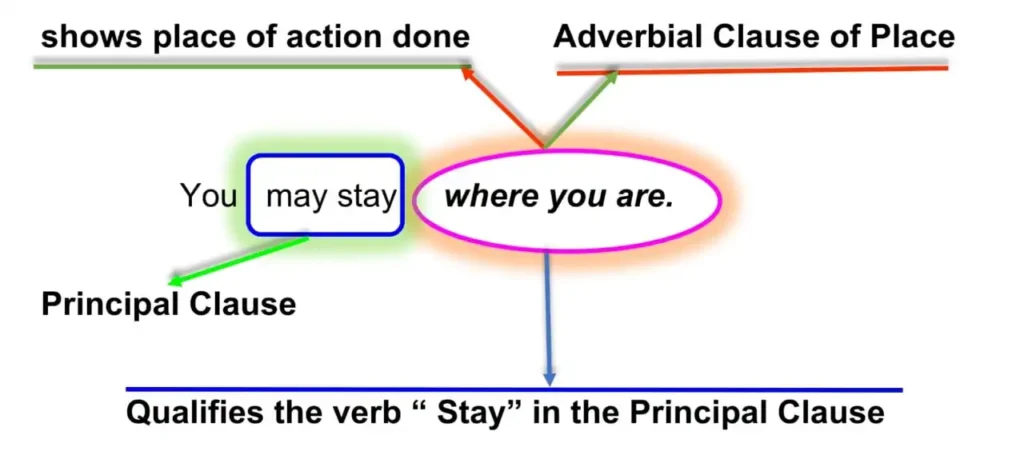
Examples of Adverbial Clauses of Place.
(i) You may stay where you are.
Explanation: “where you are” is a subordinate adverb clause and it qualifies the verb “stay” in the principal clause “You may stay.”
(ii) The dog follows his master wherever he goes.
Explanation: “wherever he goes” is a subordinate adverb clause and it qualifies the verb “follows” in the principal clause “The dog follows his master.”
Linkers or Connectives of Adverbial Clause of Place:
Normally, To identify subordinate adverbial clause of place and join two or more simple sentences, the following linkers or connectors are used.
where , whence , wherever
3. Adverbial clauses of Reason (Cause)
Adverbial clauses of Reason (Cause) show why the action is done. Adverb clauses of Reason (Cause) are introduced by the subordinate conjunction, because, as, since, and that.
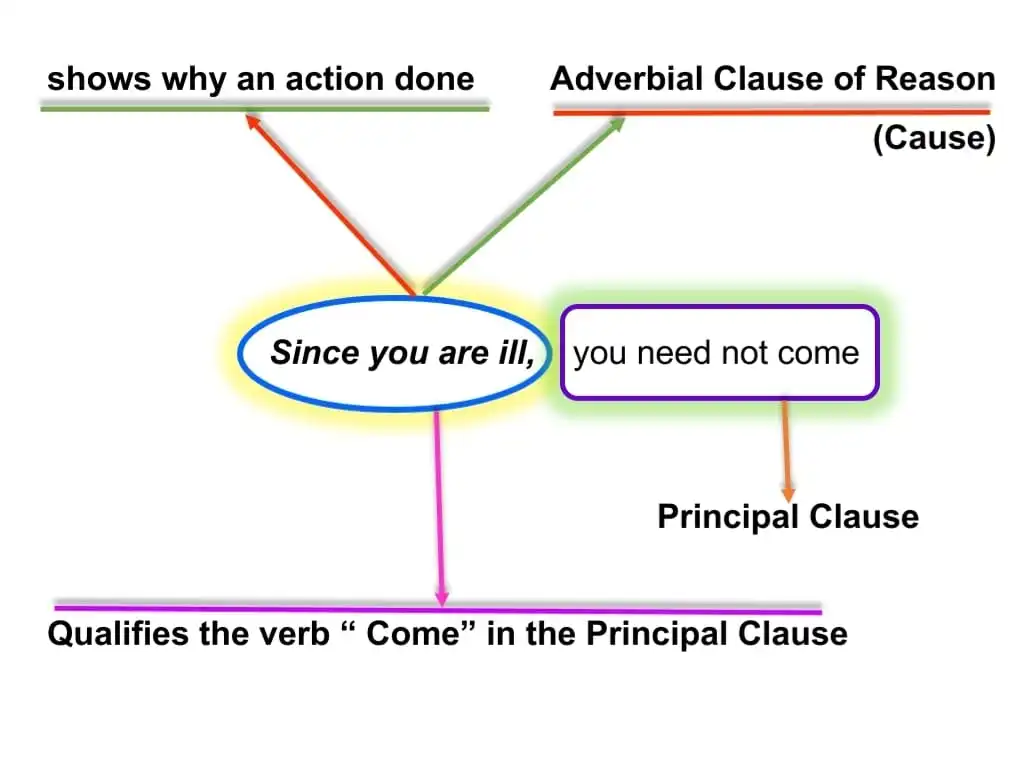
Examples of Adverbial Clauses of Reason (Cause)
(i) Since you are ill, you need not come.
Explanation: “Since you are ill” is a subordinate adverb clause and it qualifies the verb “come” in the principal clause “ you need not come ”
(ii) As it was a holiday, we went on an excursion.
Explanation: “As it was a holiday” is a subordinate adverb clause and it qualifies the verb “went” in the principal clause “we went on an excursion”
(iii) I am happy that you have come to my house.
Explanation: “that you have come to my house.” is a subordinate adverb clause and it qualifies the Adjective “happy” in the principal clause “I am happy”.
Linkers or Connectives of Adverbial Clause of Reason (Cause):
Normally, To identify subordinate adverbial clauses of Reason (Cause) and join two or more simple sentences, the following linkers or connectors are used.
Because, as, since, that. The Relatives “who” or “which” make Adverbial Clause when they signify Cause or Reason. Example: My brother who (= because he) is ill cannot come.
4. Adverbial Clauses of Purpose
Adverbial clauses of Purpose show the purpose of doing a thing. Adverb clauses of Purpose are introduced by the subordinate conjunction, that, so that, In order that, lest.
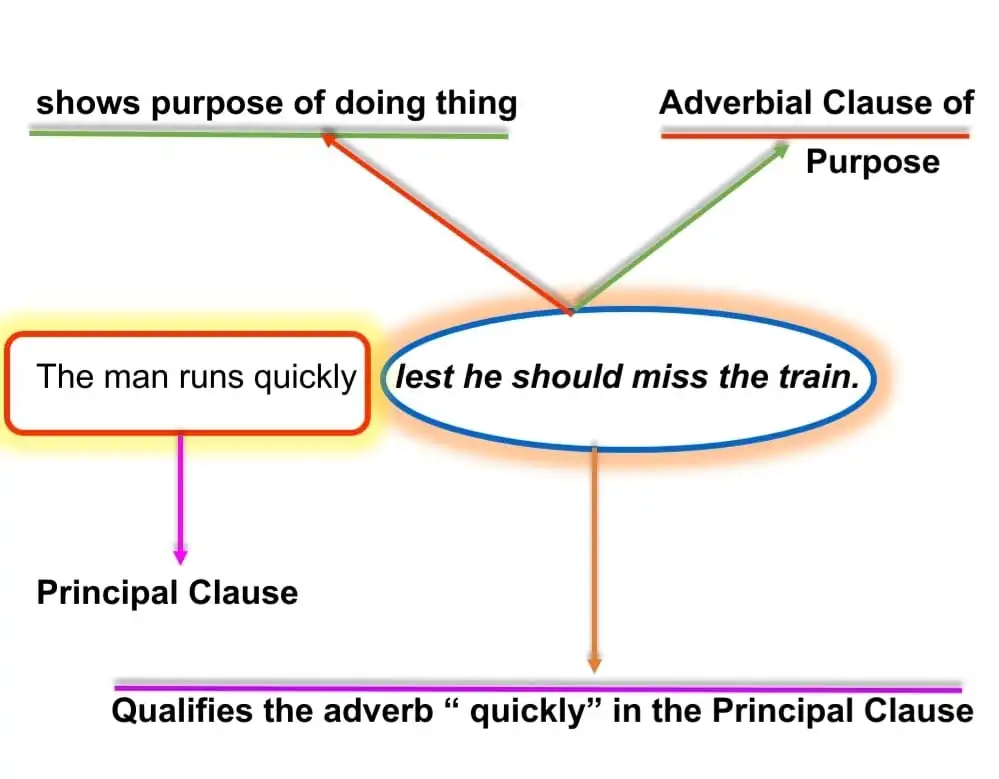
Examples of Adverbial Clauses of Purpose
(i) The man runs quickly lest he should miss the train.
Explanation: “lest he should miss the train.” is a subordinate adverb clause and it qualifies the adverb “quickly” in the principal clause “ The man runs quickly ”
(ii) We eat that ( so that/in order that ) we may live.
Explanation: “that ( so that/in order that ) we may live.is a subordinate adverb clause and it qualifies the verb “eat ” in the principal clause “ We eat ”
(iii) The Relatives “ who ” or “ which ” make an Adverbial Clauses when they signify Purpose.
Example: I have bought a dog which (= in order that it ) would guard my house at night.
Linkers or Connectives of Adverbial Clause of Purpose:
Normally, To identify subordinate adverbial clauses of Reason (Cause) and join two or more simple sentences, the following linkers or connectors are used.
that, so that, in order that, lest
5. Adverbial Clause of Result
Adverbial clauses of Result show the result of an action. Adverb clauses of Purpose are introduced by the subordinate conjunction, that with the word so or such in the principal clause.
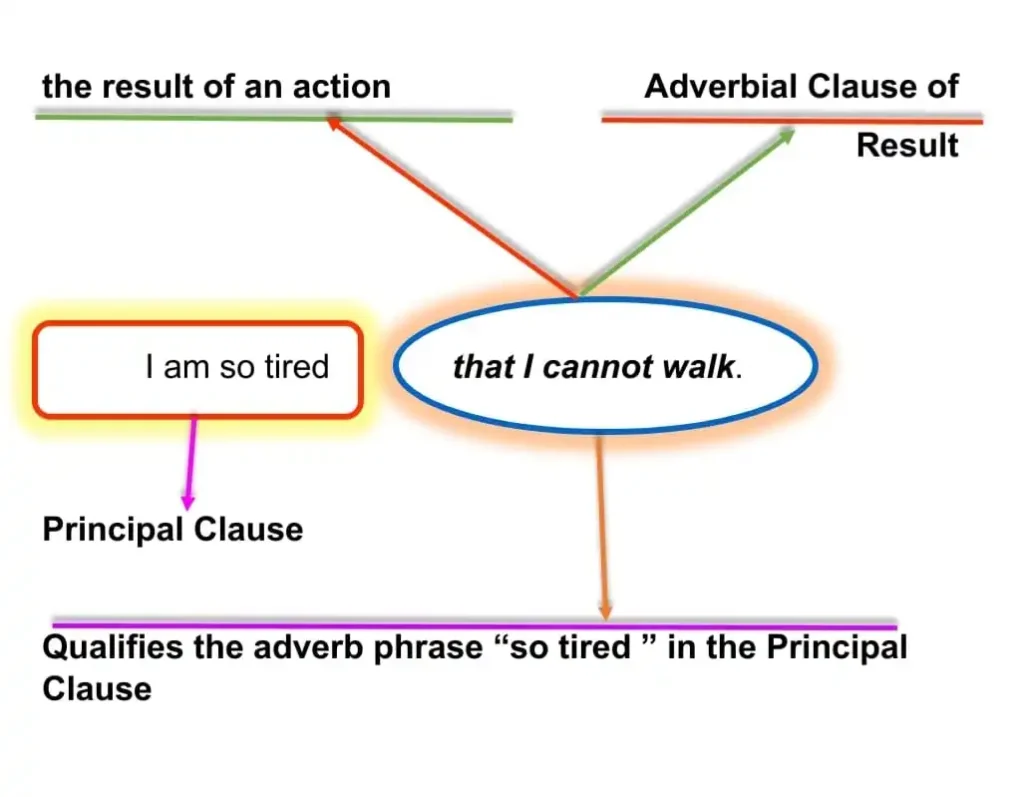
Examples of Adverbial Clauses of Result
(i) I am so tired that I cannot walk.
Explanation: “ that I cannot walk.” is a subordinate adverb clause and it qualifies the adverb phrase “ so tired ” in the principal clause “ I am so tired ”
(ii) He is such a fool that I cannot depend on him.
Explanation: “that I cannot depend on him.is a subordinate adverb clause and it qualifies the adverb phrase “ such a fool ” in the principal clause “ He is such a fool ”
(iii) The Conjunction “ that ” is sometimes omitted in Adverb clauses of Result:
Example: It is so dark we could hardly see.
Linkers or Connectives of Adverbial Clause of Result:
Normally, To identify subordinate adverbial clauses of Result and join two or more simple sentences, the following linkers or connectors are used.
that, so …… that, such……..that.
6. Adverbial Clauses of Condition or Supposition
Adverbial clauses of Condition or supposition show the condition of doing a thing. Adverb clauses of Purpose are introduced by the subordinate conjunction like if, unless, in case, whether, on condition that, provided that, supposing that.
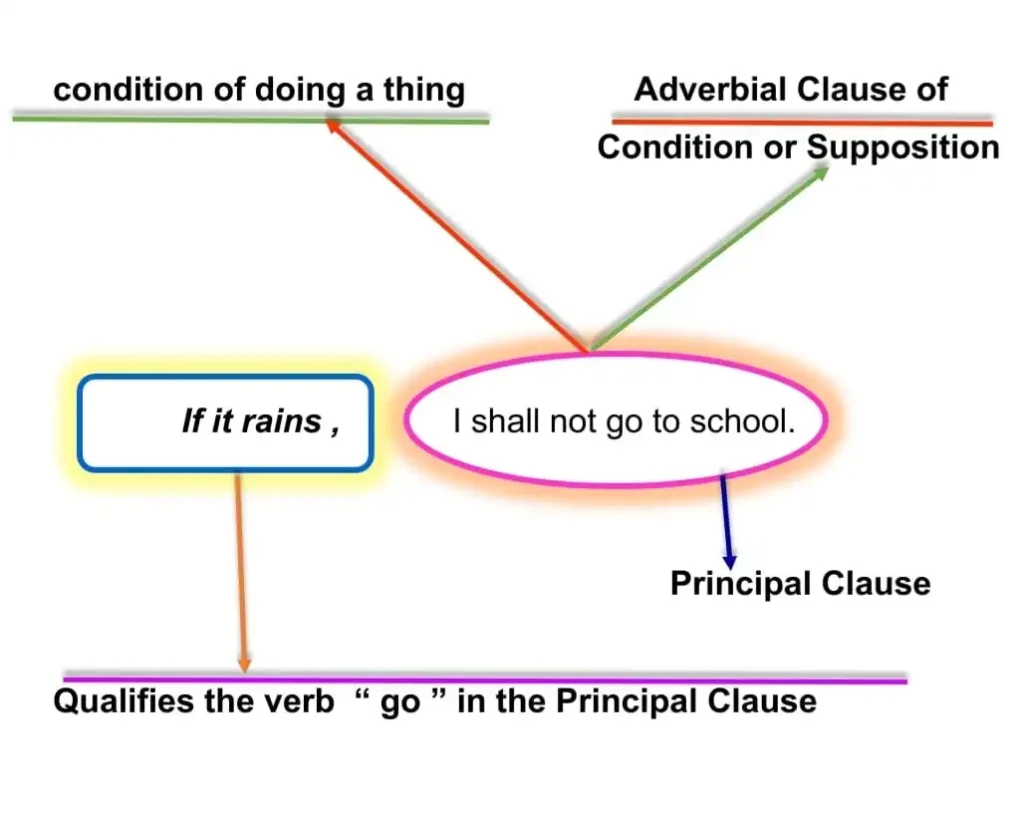
Examples of Adverbial Clauses of Condition or Supposition
(i) If it rains, I shall not go to school.
Explanation: “If it rains” is a subordinate adverb clause and it qualifies the verb “ go ” in the principal clause “I shall not go to school ”
(ii) I shall try whether I succeeded or not succeeded.
Explanation: “ Whether I succeeded or not succeeded is a subordinate adverb clause and it qualifies the verb “ try ” in the principal clause “ I shall try ”
(iii) In Adverbial clauses of Condition or Supposition, subordinating conjunctions sometimes remain omitted.
Example: Had I been ( if I had been) rich, I would have helped you.
Linkers or Connectives of Adverbial Clause of Condition or Supposition:
Normally, To identify subordinate adverbial clauses of Condition or Supposition and join two or more simple sentences, the following linkers or connectors are used.
if, unless, in case, whether, on condition that, provided that, supposing that.
7. Adverbial Clauses of Manner or Extent
Adverbial clauses of Manner or Extent show “in what manner ” or “to that extent ” a thing is done. Adverb clauses of Manner or Extent are introduced by the subordinate conjunction like as, as if, as much as, and so far as.
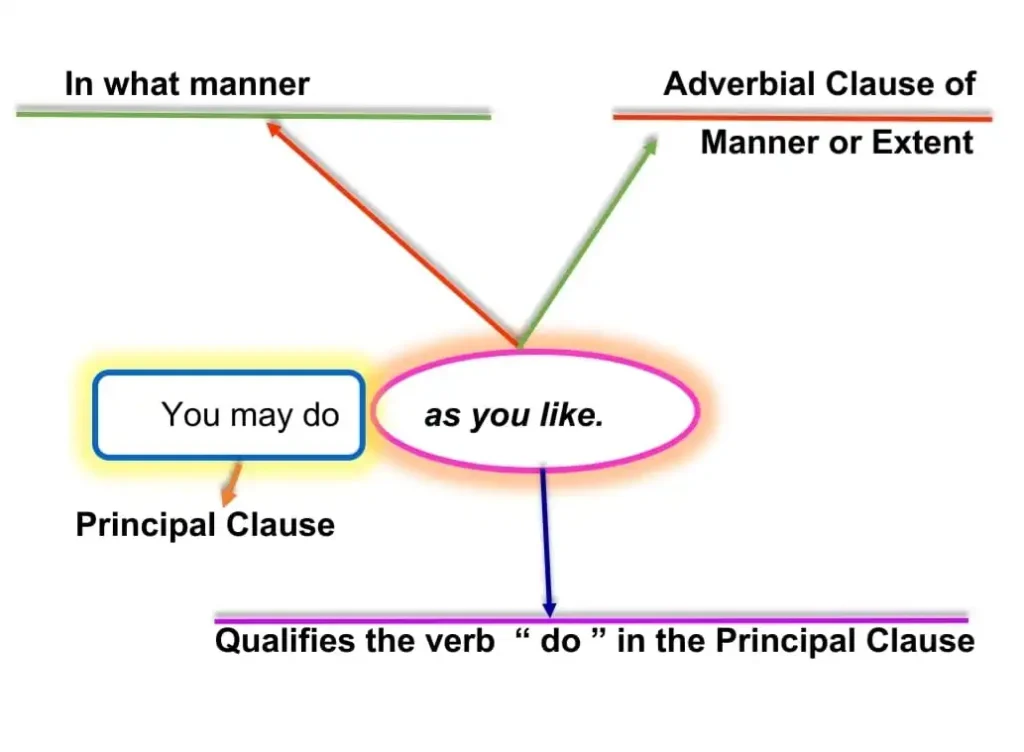
Examples of Adverbial Clauses of Manner or Extent
(i) You may do as you like. ( Manner)
Explanation: “ as you like.” is a subordinate adverb clause and it qualifies the verb “ do ” in the principal clause “ You may do ”
(ii) He loves you as much as you love him. ( Extent)
Explanation: “ as much as you love him” is a subordinate adverb clause and it qualifies the verb “ loves ” in the principal clause “ He loves you ”
Linkers or Connectives of Adverbial Clause of Manner or Extent:
Normally, To identify subordinate adverbial clauses of Manner or Extent and join two or more simple sentences, the following linkers or connectors are used.
As, as if, as much as, so far as.
8. Adverbial of Clauses of Concession or Contrast
Adverbial clauses of Manner or Extent are introduced by the subordinate conjunction like though, although, whoever, whatever, whichever, and however.
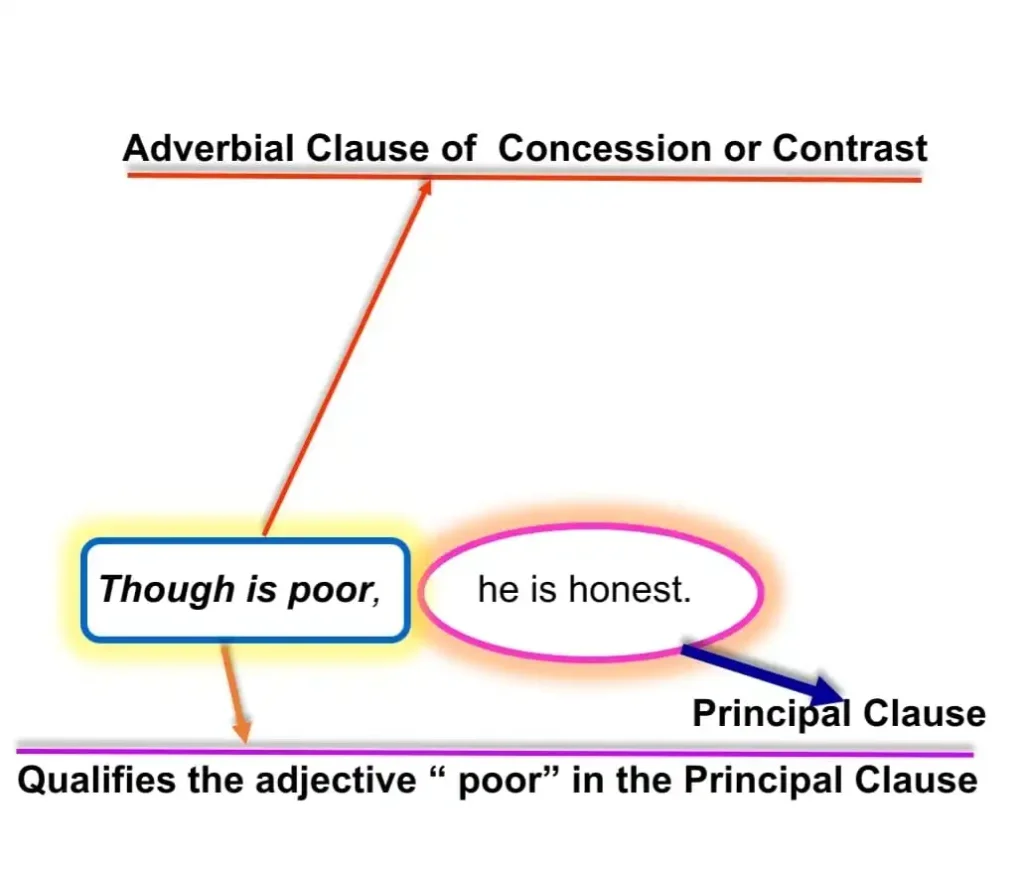
Examples of Adverbial Clauses of Concession or Contrast
(i) Though is poor, he is honest.
(ii) Whatever you may say I do not believe you.
Linkers or Connectives of Adverbial Clause of Concession or Contrast:
Normally, To identify subordinate adverbial clauses of Manner or Extent and join two or more simple sentences, the following linkers or connectors are used.
though, although, whoever, whatever, whichever, however.
9. Adverbial Clause of Comparison
Adverbial clauses of Comparison are introduced by Subordinating Conjunction “than” or Relative Adverb “as”.
Examples of Adverbial Clauses of Comparison
(i) He is not so tall as his brother.
(ii) He is as wise as you are.
An Adverb of Comparison does not qualify a verb . It always qualifies either an Adjective or an Adverb.
If an Adverb Clause is introduced by “as”, it is preceded by “so” or “as” in the principal Clause.
So, in a sentence (i) the subordinate clause as his brother and in sentence (ii) the subordinate clause as you are qualify the Adverb “so” and “as” respectively.
(iii)She is taller than you are.
(iv) I work much harder than you do.
An Adverb of Comparison does not qualify as a verb. It always qualifies as either an Adjective or an Adverb.
So, in sentence, (iii) the subordinate clause than you are qualify the Adjective taller in the principal clause, and In sentence (iv) the subordinate clause than you do qualify the Adverb “harder” in the principal clause.
The Verb in the Adverbial Clause of Comparison is often understood and not expressed.
(v) She is as beautiful as you ( are beautiful).
(vi) He is not so tall as his brother (is tall).
Linkers or Connectives of Adverbial Clause of Comparison:
Normally, To identify subordinate adverbial clauses of Comparison and join two or more simple sentences, the following linkers or connectors are used.
than, so … as, as …. as, such ….. as.
Exercises from Adverbial Clauses Examples and Types.
A. Pick out the Adverbial Clauses and write its types.
(1) Wait until I return. Stay where you are.
(2) As he is ill, he cannot come.
(3) He worked hard that he might win the prize.
(4) If you sit idle, you cannot prosper.
(5) I shall go whatever may happen.
(6) Do as I tell you.
(7) Come as soon as you can.
(8) He spoke so loud that he could be heard by everybody.
(9) Though he is weak, he will try.
(10) I shall help him, whether you like it or not.
B. Find out Adverbial Clauses examples and types
(11) However rich you may be, I am not afriad of you.
(12) I am grieved that you do this.
(13) You cannot succeed until you give up your bad habit.
(14) He came when we were playing.
(15) He came here that he might see me.
(16) I went there when it was evening.
(17) He came after I had left.
(18) He was angry with me because I had disobeyed his orders.
(19) He walked slowly lest he should fall.
(20) As he is ill, he cannot go to school.
(21) He punished me that I might be warned for the future.
(22) When I was a child, I often thought so.
C. Join the sentences with an Adverbial Clause.
[Use if, though, although, as, because, unless, till, until, as soon as, when, where etc.]
(a) Garbage is dangerous to human health. It remains uncollected for a long period.
(b) Much work has been done in the field. The odour specialists have been unable to identify any primary smell.
(c) Walter was ready to stand under the tree. He wanted to save his father.
(d) He is poor. He cannot buy his books.
(e) I entered the room. Immediately I felt something was wrong.
(f) The plant was shaded. It stopped feeding.
(g)The clock struck five. He finished his work then.
(h) You should come. Otherwise I shall not go out.
(i) He has been running temperature. He wishes to go to school.
(j) He jumped out of bed. The bell rang then.
Join the following sentences to turn Complex sentences.
(k) I cannot compete with you. You are stronger.
(l) I left the meeting. There was awful noise there.
(m) He learnt the fact. He was then angry with himself.
(n) You may be powerful. I am not afraid of you.
(o) He stared at me long. He seemed never to have seen me before.
(p) He came to my house. I was not at home.
(q) He has been running temperature. He wishes to go to school.
(r) He jumped out of bed. The bell rang then.
(s) They learned the same things. They could help one another in the homework.
(t) You are pardoned. You have confessed your crime.
Combine the following sentences with Adverbial Clauses
(u) I may grant your prayer. You shall have to ask for it.
(v) He is rich. I was in difficulty. He did not help me.
(w) It is simple. A child can understand it.
(x) He will not be able to pay off his debts. He is poor.
(y) I am his neighbor. He did not help me.
(z) He may come. Please request him to wait for me.
(aa) Don’t get off the train now. The train should stop at the station.






